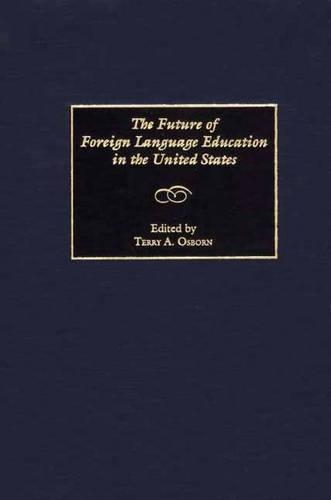
The Future of Foreign Language Education in the United States
(Hardback)
Publishing Details
The Future of Foreign Language Education in the United States
By (Author) Terry A. Osborn
Bloomsbury Publishing PLC
Praeger Publishers Inc
30th January 2002
United States
Classifications
Tertiary Education
Non Fiction
Language teaching and learning
418.0071073
Physical Properties
Hardback
208
Description
Foreign language education in the United States is undergoing a time of change, and the authors of this collection explore a broad range of issues affecting the field today. At the dawning of the 21st century, foreign language education in the United States is experiencing a period marked by exciting possibilities. Theorists and practitioners embrace a move from a perceived position of teaching only the elite to a nationally initiated cross-disciplinary and cross-cultural orientation embodied in the latest standards. Given the presence of non-English langauges in all parts of the United States, a growing number of scholars are beginning to examine the sociological context in which this educational endeavor is carried out, noting that the fugure of professional practice is inextricably linked to issues of cultural and academic context. Theory-informed practice in the coming years, therefore, will include the challenge of examining a broad range of topics related to curricular and instructional principles and procedures. The text is intended to provide a collection of perspectives related to issues of pluralism and reform as they will influence theory-informed practice of foreign language education in the coming century. Drawing from a variety of contributors from both inside and outside of foreign/second language education, this text brings the voices of scholars together focused on issues of contemporary consequence. The chapters center around a focusing theme in the form of the following question: How does the changing social and academic context of language education in the United States impact the future of our discipline
Reviews
"The Future of Foreign Language Education in the United States challenges our profession to look beyond the issues of pedagogy and standards to the social and educational changes in our country. The book presents a set of issues in-depth that the foreign language profession has only begun to consider. It is a challenging body of work, which will serve students and professionals alike as we move forward into the next century. I recommend this work for its relevance to the history, policy, and future of foreign language education."-John L Watzke Assistant Professional Specialist Graduate Program in Education Fellow, Institute for Educational Initiatives University of Notre Dame
"The Future of Foreign Language Education offers a variety of thought-provoking chapters of great interest to all foreign language educators. It addresses the historical, socio-political, epistemological, psychological and multi-cultural dimensions of foreign language education. Osborn's book is not so much about the future of teaching foreign languages as it is about the future of learning foreign languages. It directs us to consider the how and why foreign language learning will be restructured to emphasize not language for tourism or traditional literary/linguistic analysis, but language for life within an ever more international and complex American society."-Carol Saunders Department of Modern and Classical Languages Georgia State University
[c]overs everything you might want to know about foreign language education, from research about the physiological effects on a brain learning a new language to descriptions of programs effective in helping immigrant children retain fluency in their native language.-American School Board Journal
"covers everything you might want to know about foreign language education, from research about the physiological effects on a brain learning a new language to descriptions of programs effective in helping immigrant children retain fluency in their native language."-American School Board Journal
"[c]overs everything you might want to know about foreign language education, from research about the physiological effects on a brain learning a new language to descriptions of programs effective in helping immigrant children retain fluency in their native language."-American School Board Journal
Author Bio
TERRY A. OSBORN is Assistant Professor of Educational Linguistics and Second Language Education, Neag School of Education, University of Connecticut.
